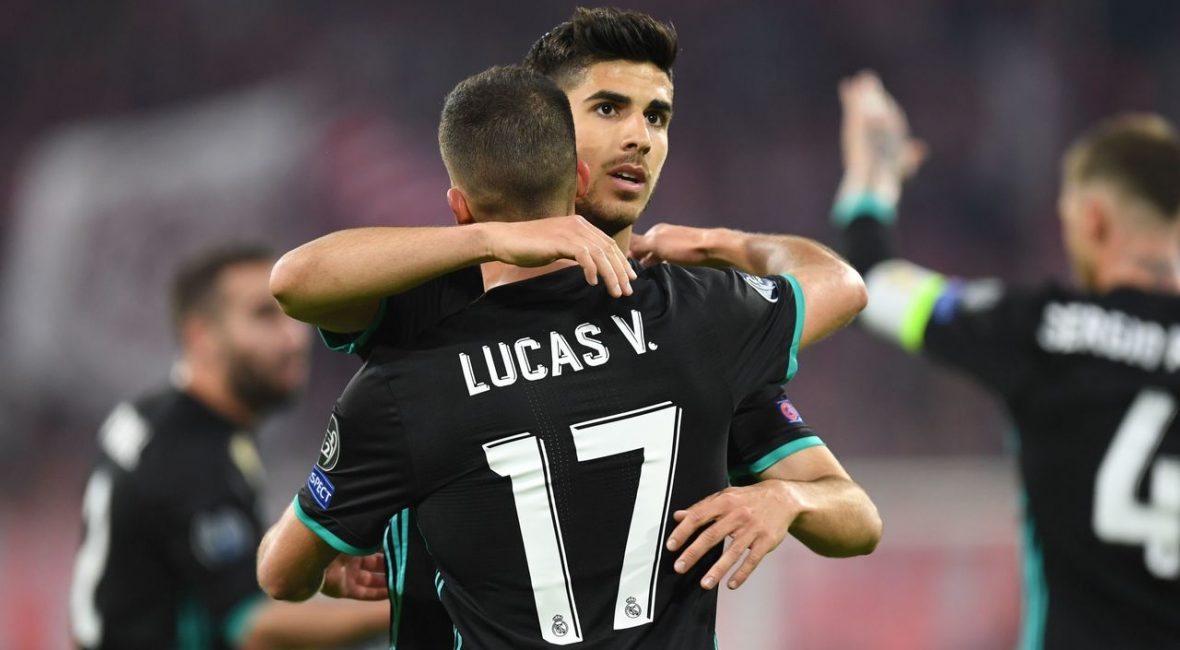4 questions answered after Real Madrid's opportunistic win vs. Bayern

It’s becoming increasingly clear that Real Madrid doesn’t have to play all that well to win. In the opening stages of Wednesday’s Champions League semi-final first leg, Zinedine Zidane’s side was overrun in midfield and unable to connect passes.
After allowing Joshua Kimmich to spring free and score the opening goal, Madrid seemed there for the taking. But wonderful strikes from Marcelo and Marco Asensio on either side of half-time – along with a pair of timely saves from goalkeeper Keylor Navas – sealed yet another win that Madrid didn’t necessarily deserve.
Here, theScore answers some of the biggest questions about European football’s greatest paradox:
How does Madrid keep doing this?

For the fourth time in the Champions League this season, Madrid has emerged as the victor despite carrying 50 percent possession or less. It doesn’t have to see much of the ball to do damage.
The stats line ran heavily in Bayern’s favour as well, with the German host managing 17 shots to the visitor’s seven, 10 corners to three, and 585 passes to 392.
The difference is that Madrid preys on opponents’ errors. Its counter-attack is lightning-quick and its vertical play yields a tonne of attempts on goal.
Sven Ulreich’s shy reaction to Marcelo’s volley allowed Madrid to equalise, while Rafinha’s misplaced pass gave way to a lethal counter. That was really it. Unlike Roma against Liverpool on Tuesday, Bayern didn’t expose itself or get anything wrong tactically. Chances in front of goal were simply wasted, and mistakes proved to be fatal.
Real Madrid have now won away to the champions of France, Italy and Germany in the knockout stages, without being particularly impressive. Peak Madrid.
— Colin Millar (@Millar_Colin) April 25, 2018
It’s nothing new for Madrid. This is a team that’s comfortable with riding out storms until the skies clear. No matter the circumstances, it has enough match-winners both on the pitch and the bench to snatch a good result.
Marcelo is so much more than an enterprising full-back. He’s got the intelligence of a playmaker and the execution of a centre-forward. It’s easy to come out of hairy situations when there’s someone of his ilk producing the goods. There’s an answer in every position.
Then there’s the example of Asensio. Three of his only four goals in the Champions League have come in the knockout stages, and the fact he’s merely a bench option is a testament to Madrid’s depth.
Are there any significant weaknesses?

The simple answer is no. Madrid is balanced across the pitch, with two solid centre-backs, a pair of attack-minded full-backs who press on demand, a midfielder in Casemiro who does all the dirty work, and one of the best footballers of all time. Even Navas has done well when called upon.
If there isn’t a glaring weakness, then there’s certainly a tendency to sleep-walk through matches. Maybe it’s arrogance in the knowledge that Madrid – with its history of winning and superior talent – will prevail in the end. Sergio Ramos always seems to produce a timely header and Cristiano Ronaldo always scores.
But the question has more to do with finishing. Madrid, and more specifically Ronaldo, was made to pay in the first half of the season for missing a litany of chances. This team cannot afford to be outplayed and send shots wide – especially with Karim Benzema enduring the worst statistical season of his Spanish career. Now that Madrid is capitalising on the few looks it has on goal, it’s difficult to stop.
Can Madrid get even better?

Zidane trusts his players so much that he’s shied away from making important signings in the transfer market, but with the average age of the squad increasing and more of the goal-scoring burden resting on Ronaldo’s accomplished feet, Madrid will at some point have to reinforce its ranks.
Even if Benzema remains capable of creating space for his teammates, he’s not scoring enough to lead Madrid’s line. A more reliable striker is needed to help Ronaldo in his final seasons at the Santiago Bernabeu.
Club president Florentino Perez could also find a better goalkeeper than Navas. The Costa Rican is by no means a bad shot-stopper – after all, his acrobatic saves against Juventus allowed Madrid to reach the Champions League semi-finals – but better options exist.
It also bears repeating that this group is virtually the same one that beat Atletico Madrid and Juventus in the 2016 and 2017 Champions League finals. Some believe this Madrid side is among the best of all time. Because it’s so well-stocked in each department, it’s difficult to argue it can get much better.
How should we judge this topsy-turvy season?

“Realistically, all we have got left is the Champions League,” Dani Carvajal said after Madrid’s elimination from the Copa del Rey, according to ESPN FC’s Sid Lowe.
It’s true that Madrid’s domestic form has concerned some supporters. The Bernabeu has witnessed some historically poor results, with the home side dropping points in 12 of 26 matches this season.
But as long as Madrid has the Champions League, the critics will be held at bay.
“The Champions League is in our DNA. It is the most important and the thing you value above anything else in the world,” Perez said in 2016.
And if Madrid were to win the European Cup for a third year in a row, it would be difficult to label the season, however tumultuous, a failure. Only two other clubs in the history of the competition have enjoyed that kind of dominance before – Ajax from 1970-73 and Bayern from 1973-76 – and both teams are remembered fondly.
(Photos courtesy: Getty Images)





